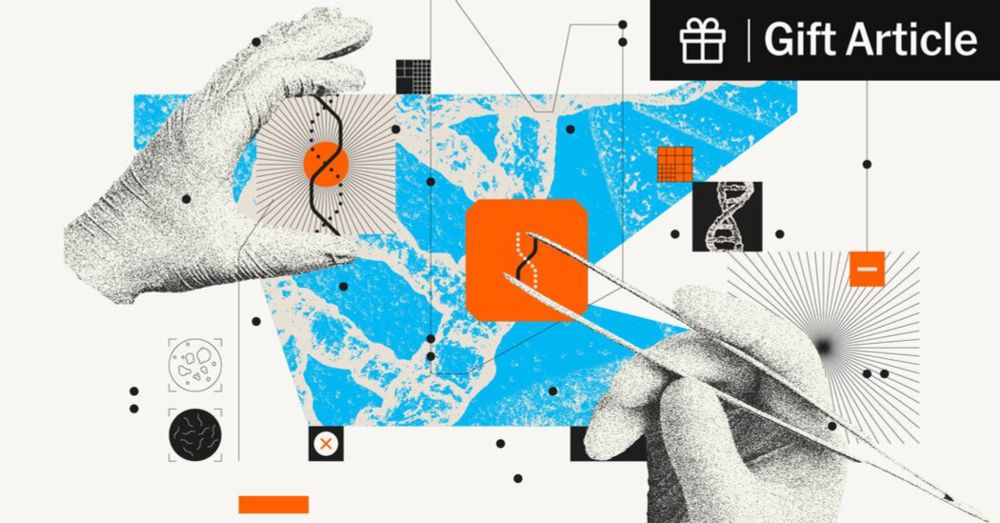
Chelsea Whyte
@chelswhyte.bsky.social
US editor at New Scientist. Co-host of Dead Planets Society podcast
Reposted by Chelsea Whyte
@chelswhyte.bsky.social went to see the Vera Rubin observatory and though I am known space hater, I could not be more excited for all we are about to see in the night sky www.newscientist.com/article/2483...

The Vera C. Rubin Observatory is about to totally transform astronomy
With the ability to scan the entire southern night sky every three days, the huge Vera C. Rubin Observatory could be about to start solving the mysteries of the universe, from dark matter to Planet Ni...
www.newscientist.com
June 13, 2025 at 7:56 PM
@chelswhyte.bsky.social went to see the Vera Rubin observatory and though I am known space hater, I could not be more excited for all we are about to see in the night sky www.newscientist.com/article/2483...
Reposted by Chelsea Whyte
Absolutely shocking and very worrying from NOAA www.newscientist.com/article/2469...

February 20, 2025 at 7:35 PM
Absolutely shocking and very worrying from NOAA www.newscientist.com/article/2469...
Reposted by Chelsea Whyte
We've got a great special report on quantum computing this week. First up, @kpc.bsky.social runs through all the big players in this growing industry, and asks who will be the first to make a machine that actually does something useful? www.newscientist.com/article/2467...

Quantum computers have finally arrived, but will they ever be useful?
Hundreds of quantum computing firms around the world are racing to commercialise these once-exotic devices, but the jury is still out on who is going to pull ahead and produce a machine that actually ...
www.newscientist.com
February 11, 2025 at 12:08 PM
We've got a great special report on quantum computing this week. First up, @kpc.bsky.social runs through all the big players in this growing industry, and asks who will be the first to make a machine that actually does something useful? www.newscientist.com/article/2467...
Listen, do I want the looming asteroid to hit anything? No, not deep down in my heart. But if it must, can it please hit the moon?? The DRAMATICS! The new crater! We could possibly see the explosion of impact!
www.newscientist.com/article/2467...
www.newscientist.com/article/2467...

There’s a tiny chance the asteroid headed for Earth could hit the moon
If asteroid 2024 YR4 does smash down on the lunar surface, the explosion might be visible from Earth and would leave a new crater on the near side of the moon
www.newscientist.com
February 10, 2025 at 6:56 PM
Listen, do I want the looming asteroid to hit anything? No, not deep down in my heart. But if it must, can it please hit the moon?? The DRAMATICS! The new crater! We could possibly see the explosion of impact!
www.newscientist.com/article/2467...
www.newscientist.com/article/2467...
Reposted by Chelsea Whyte
My leader this week is a cheerful one: it is time to accept that we have broken the climate, and for us to look at what comes next www.newscientist.com/article/mg26...

Are we entering a dangerous new phase of climate change?
A series of events, from the California wildfires to evidence we passed 1.5 degrees last year, suggests wild weather will become even more common
www.newscientist.com
January 15, 2025 at 10:24 PM
My leader this week is a cheerful one: it is time to accept that we have broken the climate, and for us to look at what comes next www.newscientist.com/article/mg26...
Reposted by Chelsea Whyte
Americans have been trying the Chinese-owned social media apps Red Note and Lemon8 as alternatives ahead of a looming US ban on TikTok. But those apps may not provide a refuge from US (or Chinese) government restrictions.
Story with comments from @emmiehine.com
www.newscientist.com/article/2464...
Story with comments from @emmiehine.com
www.newscientist.com/article/2464...

Red Note and Lemon8 are not the TikTok refuges you are looking for
The Chinese social media apps Red Note and Lemon8 have become popular alternatives for TikTok users ahead of a US government ban on TikTok. But government restrictions loom over those apps too
www.newscientist.com
January 15, 2025 at 3:52 PM
Americans have been trying the Chinese-owned social media apps Red Note and Lemon8 as alternatives ahead of a looming US ban on TikTok. But those apps may not provide a refuge from US (or Chinese) government restrictions.
Story with comments from @emmiehine.com
www.newscientist.com/article/2464...
Story with comments from @emmiehine.com
www.newscientist.com/article/2464...
Reposted by Chelsea Whyte
Is it possible that a single dramatic event, such as the eruption of a supervolcano, ever wiped out an entire species of hominin? www.newscientist.com/article/2463...

Has a volcanic eruption ever wiped out a species of hominins?
Volcanoes have been proposed as the reason for the extinction of the Neanderthals and the hobbits of Indonesia, but the end of those species may not have come from a single, dramatic event
www.newscientist.com
January 15, 2025 at 10:39 AM
Is it possible that a single dramatic event, such as the eruption of a supervolcano, ever wiped out an entire species of hominin? www.newscientist.com/article/2463...
Another conversation we seem to be always having in the newsroom
How worried should we be about a bird flu pandemic? Pretty darn worried. But there are plenty of reasons to believe that #H5N1 won't become the next covid-19, as I discuss in my latest for @newscientist.bsky.social www.newscientist.com/article/2463...

How worried should we be about a bird flu pandemic?
The first known death from a bird flu virus in the US has sparked fears about another pandemic, yet the overall risk to the general public still remains low
www.newscientist.com
January 13, 2025 at 4:03 PM
Another conversation we seem to be always having in the newsroom
I really enjoyed this week's pod, especially the conversation about gene editing. If you want to know what it feels when we chat in our newsroom, have a listen
Podcast!
🧬Gene-editing of human embryos - the case for and against
🐦The pandemic risk of H5N1
🍝The raging battle over how to make cacio e pepe
with @pennysarchet.bsky.social, @gracewade.bsky.social and @mjflepage.bsky.social
podcasts.apple.com/gb/podcast/n...
🧬Gene-editing of human embryos - the case for and against
🐦The pandemic risk of H5N1
🍝The raging battle over how to make cacio e pepe
with @pennysarchet.bsky.social, @gracewade.bsky.social and @mjflepage.bsky.social
podcasts.apple.com/gb/podcast/n...

Weekly: Gene-editing to make superhumans; first bird flu death in the US; perfect pasta with physics
Podcast Episode · New Scientist Podcasts · 10/01/2025 · 28m
podcasts.apple.com
January 13, 2025 at 4:02 PM
I really enjoyed this week's pod, especially the conversation about gene editing. If you want to know what it feels when we chat in our newsroom, have a listen
Gotta try this. My cacio e pepe is so inconsistent. Sometimes it's gloriously creamy and others it's just a gloop fest
Physicists have discovered the key to a consistently delicious cacio e pepe pasta, a traditional Italian dish made with black pepper and pecorino cheese.. www.newscientist.com/article/2463...

Physicists discover the secret to perfect cacio e pepe pasta
The classic Italian cacio e pepe pasta is notoriously tricky to get right, but physicists have come up with a trick to achieve a perfectly smooth cheese sauce
www.newscientist.com
January 13, 2025 at 3:59 PM
Gotta try this. My cacio e pepe is so inconsistent. Sometimes it's gloriously creamy and others it's just a gloop fest
Reposted by Chelsea Whyte
It's not unexpected, but it's still absolutely shocking www.newscientist.com/article/2463...

2024 confirmed as first year to breach 1.5°C warming limit
Scientists warn efforts to limit the long-term temperature rise to 1.5°C will fail as data confirms 2024 was the hottest year in human history
www.newscientist.com
January 10, 2025 at 6:32 AM
It's not unexpected, but it's still absolutely shocking www.newscientist.com/article/2463...
Reposted by Chelsea Whyte
All the data now officially in from WMO, NASA, NOAA, UK Met Office, EU Copernicus, Japan Met Agency, Berkeley Earth: 2024 was the hottest year on record, and the first year to see global average temps rise 1.5°C above the pre-industrial baseline in average across datasets. 🧪

2024 confirmed as first year to breach 1.5°C warming limit
Scientists warn efforts to limit the long-term temperature rise to 1.5°C will fail as data confirms 2024 was the hottest year in human history
www.newscientist.com
January 10, 2025 at 6:42 PM
All the data now officially in from WMO, NASA, NOAA, UK Met Office, EU Copernicus, Japan Met Agency, Berkeley Earth: 2024 was the hottest year on record, and the first year to see global average temps rise 1.5°C above the pre-industrial baseline in average across datasets. 🧪
Reposted by Chelsea Whyte
We will never, ever know who writes this column. But there's a fascinating bit about flat-Earthers from them this week.
bsky.app/profile/mich...
bsky.app/profile/mich...
In this week's Feedback in @NewScientist.bsky.social , the happily anonymous columnist highlights the scientific journal Intelligence, which has published a medley of race science and flat Earth - in other words, pretty much the opposite of what its title suggests.

A first nomination for the 2025 Reverse Nominative Determinism award
Feedback has found a contender for the 2025 Reverse Nominative Determinism gong: the scientific journal Intelligence
buff.ly
January 9, 2025 at 1:18 PM
We will never, ever know who writes this column. But there's a fascinating bit about flat-Earthers from them this week.
bsky.app/profile/mich...
bsky.app/profile/mich...
Reposted by Chelsea Whyte
An explainer on human metapneumovirus, or hMPV 🧪
Bottom line: this is not another pandemic starting but like other cold viruses 🦠 hMPV can sometimes kill the vulnerable, such as very young children. We need a vaccine, and hopefully we'll have one soon
www.newscientist.com/article/2462...
Bottom line: this is not another pandemic starting but like other cold viruses 🦠 hMPV can sometimes kill the vulnerable, such as very young children. We need a vaccine, and hopefully we'll have one soon
www.newscientist.com/article/2462...

What is hMPV, the virus spreading through China?
An uptick of human metapneumovirus (hMPV) cases in China has raised concerns over another pandemic, which appear to be unfounded
www.newscientist.com
January 7, 2025 at 5:26 PM
An explainer on human metapneumovirus, or hMPV 🧪
Bottom line: this is not another pandemic starting but like other cold viruses 🦠 hMPV can sometimes kill the vulnerable, such as very young children. We need a vaccine, and hopefully we'll have one soon
www.newscientist.com/article/2462...
Bottom line: this is not another pandemic starting but like other cold viruses 🦠 hMPV can sometimes kill the vulnerable, such as very young children. We need a vaccine, and hopefully we'll have one soon
www.newscientist.com/article/2462...
Reposted by Chelsea Whyte
It is also extremely important to me that you see the version of Pluto and Charon's capture that I set to music.
January 6, 2025 at 4:25 PM
It is also extremely important to me that you see the version of Pluto and Charon's capture that I set to music.
Reposted by Chelsea Whyte
A person in Louisiana who became severely ill with bird flu in December has passed away from the infection, marking the first known bird flu death in the US 🧪

US reports first human death related to bird flu
A person in Louisiana who became severely ill with a bird flu virus known as H5N1 in December has passed away from the infection, marking the first known bird flu death in the US
www.newscientist.com
January 6, 2025 at 10:20 PM
A person in Louisiana who became severely ill with bird flu in December has passed away from the infection, marking the first known bird flu death in the US 🧪
Reposted by Chelsea Whyte
To mark five years of the pandemic, my team and I have put together a special issue on covid-19. I'll be tweeting about it over the next few days, but a good starting point is my leader explaining why now is the right time to look back, even if it feels difficult www.newscientist.com/article/mg26...

We must revisit the covid-19 pandemic to prepare for future outbreaks
It is tempting to lock memories of the height of covid-19 away but looking back is vital for preparing properly for the next pandemic
www.newscientist.com
January 1, 2025 at 9:23 PM
To mark five years of the pandemic, my team and I have put together a special issue on covid-19. I'll be tweeting about it over the next few days, but a good starting point is my leader explaining why now is the right time to look back, even if it feels difficult www.newscientist.com/article/mg26...
Reposted by Chelsea Whyte
The stargazing events to look forward to in 2025, from auroras to partial eclipses 🧪 by @leahc.bsky.social

The stargazing events to look forward to in 2025
From auroras to partial eclipses of the sun, Leah Crane is planning out the astronomical events she will be watching next year
www.newscientist.com
December 30, 2024 at 2:33 PM
The stargazing events to look forward to in 2025, from auroras to partial eclipses 🧪 by @leahc.bsky.social
This is so fun, and I found it so sweet that the scientists involved still find joy in the beauty of a snowflake ("This looks quite pretty actually"), even though they spend their lives researching them.
How to make a giant snowflake, featuring:
A crack team of (very game) academics
One tarpaulin
One kettle
One bicycle pump
One empty drinks bottle
A very, very cold room
Watch & read about my snow-making exploits here
www.newscientist.com/article/mg26...
A crack team of (very game) academics
One tarpaulin
One kettle
One bicycle pump
One empty drinks bottle
A very, very cold room
Watch & read about my snow-making exploits here
www.newscientist.com/article/mg26...

How a plan to make the world's largest snowflake was humbled by nature
We assembled a crack team to create a record-breaking snowflake. Along the way, we learned just how impressive the natural kind really are
www.newscientist.com
December 13, 2024 at 8:38 PM
This is so fun, and I found it so sweet that the scientists involved still find joy in the beauty of a snowflake ("This looks quite pretty actually"), even though they spend their lives researching them.
This is wild. I stopped several times to read a sentence or two out loud to colleagues, with more concern each time.
Over 30 prominent scientists call for a ban on the creation of a "mirror cell"--a microbe made of molecules that are mirror images of their natural forms. It could cause a mind-boggling global disaster. Here's my story [gift link] 🧪https://nyti.ms/3OUCXp6

A ‘Second Tree of Life’ Could Wreak Havoc, Scientists Warn (Gift Article)
Research on so-called mirror cells, which defy fundamental properties of living organisms, should be prohibited as too dangerous, biologists said.
nyti.ms
December 12, 2024 at 8:23 PM
This is wild. I stopped several times to read a sentence or two out loud to colleagues, with more concern each time.
This was so good, I couldn't wait for each next tweet. Treat yourself
If we're doing Les Mis discourse, here's the time I live-tweeted reading the book x.com/jjaron/statu...
x.com
x.com
December 12, 2024 at 6:54 PM
This was so good, I couldn't wait for each next tweet. Treat yourself
Reposted by Chelsea Whyte
In September the largest number of entangled logical qubits, an important resource for quantum computers correcting their own errors, was 24 and I was writing about it for
@newscientist.bsky.social The number has now jumped to 50, and I am writing about it again www.newscientist.com/article/2459...
@newscientist.bsky.social The number has now jumped to 50, and I am writing about it again www.newscientist.com/article/2459...

Another record has been set for the most entangled logical qubits
Just a few months after the previous record was set, a start-up called Quantinuum has announced that they’ve entangled the largest number of logical qubits – this will be key to quantum computers that...
www.newscientist.com
December 11, 2024 at 9:17 PM
In September the largest number of entangled logical qubits, an important resource for quantum computers correcting their own errors, was 24 and I was writing about it for
@newscientist.bsky.social The number has now jumped to 50, and I am writing about it again www.newscientist.com/article/2459...
@newscientist.bsky.social The number has now jumped to 50, and I am writing about it again www.newscientist.com/article/2459...
Reposted by Chelsea Whyte
Liquid metal can be used to grow human cells @sparkes.bsky.social
www.newscientist.com/article/2459...
www.newscientist.com/article/2459...


December 12, 2024 at 9:55 AM
Liquid metal can be used to grow human cells @sparkes.bsky.social
www.newscientist.com/article/2459...
www.newscientist.com/article/2459...
James is reporting all week from #agu2024. Follow for more
The ocean carbon sink – which removes about a quarter of our CO2 emissions each year – was much weaker than expected in 2023, according to preprint from @jens-d-mueller.bsky.social etal. Doubly concerning alongside signs of weakening land carbon sink. #agu2024
www.newscientist.com/article/2459...
www.newscientist.com/article/2459...

Extreme heat may rapidly sap the ocean’s ability to absorb CO2
The ocean carbon sink – which removes about a quarter of our emissions from the atmosphere each year – was much weaker than expected in 2023
www.newscientist.com
December 10, 2024 at 10:49 PM
James is reporting all week from #agu2024. Follow for more
i don't know what to say about this except that i hate this worm and his mandibles
www.newscientist.com/article/2459...
www.newscientist.com/article/2459...

Screwworm: Why is this flesh-eating parasite making a comeback?
A resurgence of the screwworm parasite in Central America could have a devastating impact on livestock farming, and poses a threat to humans and wildlife too
www.newscientist.com
December 10, 2024 at 9:58 PM
i don't know what to say about this except that i hate this worm and his mandibles
www.newscientist.com/article/2459...
www.newscientist.com/article/2459...

